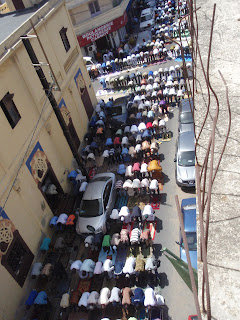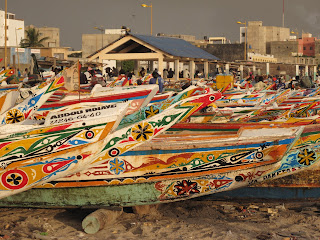Yes, it is a sheep on the billboard. An African sheep apparently....
This Friday, Tabaski - the biggest religious holiday in Senegal, and for that matter the rest of the Islamic world - took place. In short, the Muslims celebrate and remember Ibrahim's unlimited devotion to God when he was ready to kill his own son to proof his faith. God was so kind as to replace the son with a sheep; hence sheep is the recurring theme.
This is a MAJOR event! During the last month it has been clear to me that something big was brewing, as the streets started to get crowded with herds of sheep and the tailors were working around the clock. But I had not imagined that this holiday could exceed the annual Christmas-fuzz that I know so well from Denmark. I was supposed to do field work last week, but we had to postpone it since people simply could not concentrate on anything else than 'la fête' as the big day approached. It could take me 2-3 hours to return from the office in the evening, because the entire population of Dakar is preparing, getting their hair done, grocery shopping, visiting their tailor, choosing their sheep etc. Everyone is on the move. The consumption taking place is excessive considering how modest most Senegalese are living normally. Normally, everybody returns to their villages to be with their (laaaaarge) family during those days. This means that Dakar is absolutely deserted over the weekend. Unfortunately I did not have the chance to experience this, since I was in out of town, but I saw images from Dakar on the news and I could hardly recognise the city. It is namely not only the Muslims that return to their families to celebrate, the remaining 5% of the population are often invited to join as well. A Muslim colleague of mine even invited me to celebrate Tabaski with her and her family in Thiès, a city inland a few hours from Dakar. That is exactly what the religious fraternity that I mentioned in my last post is about. They do not care if your God is called Allah or Buddha or is non-existing. All are welcome to participate in the holiday on their own premises. The Christians staying at home during Tabaski receive presents, visits and big amounts of meat from their Muslim neighbours and friends, to make sure that no one is hungry or lonely on Tabaski.
So, Thursday at 13.00 sharp (meaning at 14-14.30, when do I learn it?) me and my colleague left the office to find a '7-places' at the bus station that could take us to Thiès. A 7-places is a normal car with seats in the trunk as well, summing up to 7 seats. That seemed pretty comfortable to me compared to many of the other transportation possibilities you have here in Senegal. Unfortunately, none of the 7-places were destined for Thiès, so we had to take a 'car rapide' (see picture in earlier post). That was, put in a nice way, an authentic experience! Apparently, there is no limite to what you can fit into and onto such a vehicle. Suitcases and live sheep are tied to the roof of the small bus. The excessive exodus of the big cities caused complete chaos on the roads and our driver even had to descend the car several times to tell off the other drivers. After a long and exhausting trip I arrived at my destination, and was given a warm (literally) welcoming by mothers and fathers, uncles and aunts, cousins and children and random people (like me) who, for some reason, also are part of the family.
Friday morning I woke up very early from the sound of panicking sheep. I grabbed my camera and rushed to the entrance of the house. There I found five huge sheep waiting to be slaughtered. Before that the men had already been to the mosque for morning prayer. Now everybody was gathered for the ceremony of the slaughtering, children as well as adults. Each sheep belongs to someone in the family. The first 'kill' is the biggest sheep, of course belonging to the man of the house, the old Papa Aliou. Next came the sheep of the big brother, followed by the sheep of the sisters and old Mama Ndeye and so on and so forth. It was carnage, but I am proud to say that I stayed throughout the entire ceremony. It was after all reassuring to see how professional and painless the process was and within an hour all five sheep ready to eat.
 |
| Sheep before being slaughtered |
 |
| Sheep after slaughtering |
When the meat is parted and ready the women start cooking, and this goes on for the rest of the day. The entire sheep is used, even the balls! They start by frying the insides, which is eaten with an onion sauce and mustard while preparing the rest of the meat. After hours of continuing cooking and eating, the huge lunch is ready and we can finally get something to eat... or wait, what did we do the whole day again?? The 'lunch-meat' is served on big shared plates with fries and onion sauce (they loooove onion) men, women and children eating separately:
The rest of the night we spent visiting neighbours and friends of the family. People were incredibly welcoming, they all wanted to shake my hand and know where I came from, and share their Tabaski with me. Looking back at this unforgettable experience I can truly confirm that Senegal is the land of 'teranga' (hospitality)!



















